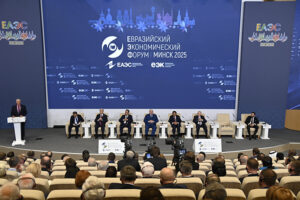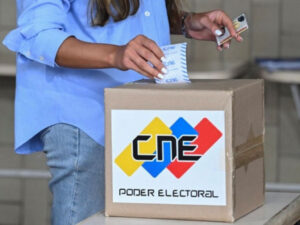The economic siege has exacerbated the financial limitations and access to credit for repairing the country’s thermoelectric plants, acquiring technologies and the fuel required for strategic sectors of the national economy
«I imagine a very prosperous country, where we can develop ourselves and where all young people aspire to make their life project,» she states without hesitation when asked what a Cuba without a blockade would be like. Then she pauses the thread of conversation and exemplifies why this cruel, extraterritorial policy of economic asphyxiation «affects the people the most.»
Dayana Beyra Fernández, director of the basic business unit Oil Engineering and Projects Company, is seated in a modest office. Behind her there is a bust of Martí on the desk, two Cuban flags, a portrait of Fidel and another of Che. And she says: «until one lives the reality of the blockade imposed by the United States in one’s own flesh, one does not truly know the real dimension that this inhumane policy reaches,» because «what a cruel way to attack a people!»
The first time Dayana was at the unloading of a liquefied petroleum gas (LPG) vessel, the gas could not be passed through the pipelines from the dock of the Ñico López Refinery to the joint venture that receives and packages it in small balls, because those conduits crossed the grounds of the former Esso Standard, nationalised by the Revolutionary Government and which the U.S. considers in dispute.
Despite that claim being illegitimate, if the company agreed to unload the gas using those lines, it could expose itself to sanctions from the White House.
But the gas had to be unloaded, and so, «it was necessary to invest in an exclusive and expensive line for the LPG, that did not pass through that land, so that the company would agree to operate the vessel.»
It was then that she saw for the first time that «the blockade is a very serious thing,» because foreign companies are afraid that some sanction will be imposed on them.»
Years later, when she worked as a process technologist at the Catalytic Cracking plant, the only one of its kind in Cuba, and which supplied the majority of the liquefied gas needed by Havana and a part of the West of the country, she witnessed another prohibition:
«The Brazilians who sold us the catalyst closed the contract suddenly, because a U.S. company had bought 50% of the factory’s shares.»
She recalls that they had to «run» to find a similar catalyst: a selective one that allowed obtaining fuels like gasoline and LPG from a lower-value product.
And the effort, to avoid causing a production gap in the plant, was enormous.
Blackouts, transport, fuel…, quality of life. About all that which harms the Cuban, Dayana does not hold back in speaking.
She takes the opportunity and says that every day she comes across cases where foreign technicians arrive in the country to start up necessary technologies in the thermoelectric plants, but withdraw «as soon as they step on the Cuban airport,» pressured by the restrictions imposed from abroad.
Furthermore, she comments, «there is denial of credit or access to spare parts, even if we have the money, because these contain American components. That is why it has been very complicated to keep the thermoelectric plants running.»
She also mentions that she has colleagues who have been sanctioned directly for having the audacity to head Foreign Trade companies in charge of transporting fuels to Cuba. «And, even so, they, with great bravery, continue seeking alternatives and working for the Cuban state company.»
This siege, which exacerbates financial limitations, can be illustrated by a simple example: the economic transactions that have been returned to the Island’s banks, as if Cuban money were no good.
«What is the route we are going to use to get the money to the supplier?» asks Dayana, and she knows that is one of the unknowns for any Cuban.
Life, she continues, becomes much more expensive when we must carry out multiple currency conversions to acquire some necessary product, «and that could be resolved by buying directly from a supplier.»
Dayana, who is also a deputy to the National Assembly of People’s Power for the capital municipality of Regla, retains the tenacity of always: the same that she demonstrates every time she defends Cuba and the oil sector.
For her, the Cuba Petróleo Union (Cupet) lives by dodging the blockade, because if it were not so, «it would not be possible to bring fuel to the nation. It becomes too difficult. Therefore, we must continue uniting people and countries that support the just cause of the cessation of this hostile U.S. policy.»
–And if with these difficulties we face, with this economic and financial siege we have managed to survive, what would we be like without a blockade?
–I believe we could have the prosperous country we owe to the people. A Cuba without a blockade would be the one we desire: with superior living conditions, with the Revolution’s programmes at their best, with happier boys and girls…».
The persecution of fuel transport operations to Cuba, including shipping companies, insurers, reinsurers, banks, individuals and governments, has reduced the portfolio of foreign suppliers; and those that remain have increased prices considerably, based on Country Risk.
IN THE THERMOELECTRIC PLANTS
Since 10 January 2024, the Ernesto Guevara thermoelectric plant (CTE) has not received spare parts for its pumps because the Italian supplier company C.R. Technology Systems was acquired by Trillium Flow Technologies, which manages purchases from the U.S. The lack of authorisation from OFAC for the legal permits meant the contract could not be completed.
The CTEs Ernesto Guevara, 10 de Octubre and Máximo Gómez use electrohydraulic actuators Voith in their modernised turbines. The usual suppliers, such as Real Control and Energo Control, have informed that, due to the Helms-Burton Act, they cannot sell this equipment to Cuba.
The company Taichi hd Cuba was requested to supply a new AVR excitation system type VCS-6 000 for the CTE Carlos Manuel de Céspedes, and they responded that Mitsubishi Generator Corp. is the appropriate one to manage this matter. But that it cannot present a quotation due to the strict U.S. sanctions, and this cannot be modified.




